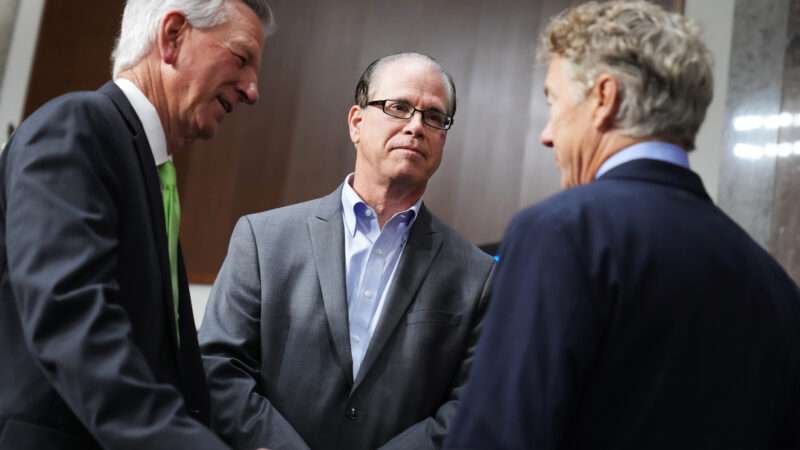
As he wrapped up a press conference calling attention to the various problems with rushing to pass a 4,400-page spending bill that lawmakers didn't have a chance to read and that will add to America's growing pile of debt, Sen. Mike Braun (R–Ind.) fielded an important, and obvious, question.
Didn't Republicans do this exact same thing when they were in charge of the Senate a few years ago?
"I'll just cut to the chase. We're hypocrites there," Braun said. "[Democrats] are unapologetic about it. We claim to be fiscal conservatives and accommodate it year after year. I place more blame on us than I do on them, in the sense that we say we're against it, but then we go along with it."
Braun's right about that. The $1.7 trillion omnibus spending bill that cleared the Senate with a vote of 68–29 on Thursday afternoon is yet another bipartisan failure on the part of Congress—which might be the only place in America where there wasn't any belt-tightening after a year of inflating prices and rising interest rates. The House of Representatives is likely to pass the bill Thursday night, sending it to President Joe Biden's desk.
The bill's passage in the final days before Christmas literally means the government will not shut down at the end of the year, but it is also a metaphorical victory for business as usual in Washington, D.C. It is yet another massive spending package that was thrown together immediately before a deadline, in violation of the rules and so-called "normal order" that Congress is supposed to follow when crafting legislation.
"It has become far too easy for Congress to escape its own rules designed to prevent reckless spending," Sen. Rand Paul (R–Ky.) said on the Senate floor Thursday afternoon. "The bill in process ignores soaring inflation, rising interest rates, and our ballooning debt of $31 trillion. Enough is enough."
Paul was trying to get support for a point of order that would make a technical tweak to the Senate's rules—or, rather, to when the Senate can ignore its rules. He was asking lawmakers to require that two-thirds of the Senate approve any attempt to waive the normal rules that apply to the passage of spending bills. His proposal was voted down in a bipartisan manner.
"I'm disappointed in some of my fellow Republicans, who voted against respecting the taxpayers and for empowering themselves to spend your money with reckless abandon," he tweeted afterward.
The processes and procedures that govern the movement of legislation through Congress are boring, often arcane, and sometimes seem as if they exist only to slow the passage of bills. But that's kind of the whole point. A rushed process creates bad results and opportunities for abuse. There's no opportunity to vet individual spending proposals—like $3 million intended to make highways more bee-friendly or a huge pay raise for the rent-a-cops at the Transportation Security Administration—and little opportunity for lawmakers to even understand what they are voting on. Everyone just wants to get home in time for Christmas.
As a result, policies that would have struggled to get majority support if offered as an amendment in committee or on the Senate floor end up getting mashed into the omnibus—and there's no realistic opportunity to block them. No wonder spending keeps going through the roof. No wonder the federal government is facing the prospect of the largest non-pandemic budget deficit in history this year.
Leadership in both parties is to blame for this, but as retiring Sen. Pat Toomey (R–Pa.) pointed out to me in an interview earlier today, there's plenty of blame to be spread around.
"The leadership needs the complicity of the membership to pull this off," he said. "If the members, for instance, were sufficiently disgusted with this process, as I think they should be, then they could deny cloture to the final product or refuse to pass this omnibus bill and force the process to change. But I think you will witness today that that's not going to happen. They will get cloture, they'll get 60 votes. They'll pass this. And the lesson that leadership will learn is we can do this yet again in the future."
You can bet that this same game will be played again in the future—probably in the days before Christmas 2023 with the willing consent of both Republicans and Democrats. It's no way to run a government, but it's the only way that anything seems to get done in Congress anymore.
The post The Senate's Passage of the $1.7 Trillion Omnibus Spending Bill Is a Bipartisan Failure appeared first on Reason.com.







